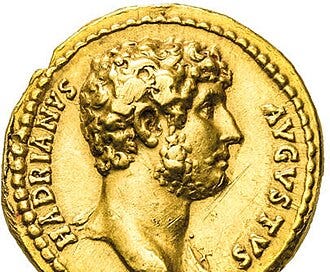On this day. 10 July, in the year AD 138, the Emperor Hadrian died. He left behind a huge imperial legacy – and one tiny poem.
Born in Spain (near Seville) to a distinguished Roman family, Hadrian succeeded Trajan as Emperor when the latter died in 117. In 122 he initiated the construction of what was to become Hadrian’s Wall, though he never lived to see it finished. His operations in Judaea in the 130s (after the so-called Bar Kochba revolt) are said to have led to the deaths of 580,000 Jews and the destruction of 985 towns, a sober reminder of the horrific scale of casualties that could result from ancient Roman warfare.
According to the author of his biography, Hadrian wrote a number of short poems in Greek, as well as this short, bittersweet, Latin poem addressed to his life-spirit shortly before his death. The metre is iambic dimeters (the English equivalent is Hilaire Belloc’s “the nicest boy I ever knew / was Charles Augustus Fortescue” u - u- / u - u -), with the first and fourth lines using double-short syllables in place of single long ones e.g. u uu u uu / u - u - (‘the littlest fellow I ever knew…’).
My translation echoes the basic Latin rhythm:
Dear fleeting spirit, kindly heart, my body’s friend and bosom guest, to what realms will you now depart, all pale and stiff and shorn of zest, and robbed of your accustomed jest?
In Latin:
Animula vagula blandula Hospes comesque corporis Quae nunc abibis in loca Pallidula rigida nudula, Nec, ut soles, dabis iocos?





Such a boon to have the spoken version as well!
How brave and how melancholy to write something like this. Did he know he was soon to die? How does this compare to his other poems?